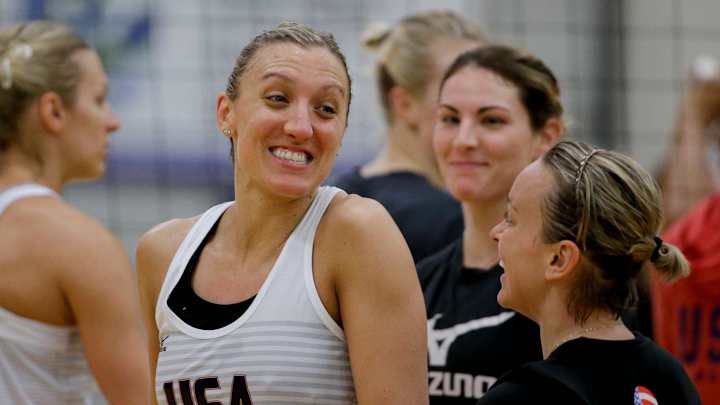US volleyball peer reviews pay off before Rio qualifying

LINCOLN, Neb. (AP) The experiment might have backfired with any other group: A decorated former player-turned-coach asked a team of world-class athletes to share candid feedback about each other through peer reviews.
U.S. women's volleyball coach Karch Kiraly would have considered scrapping the idea altogether had his players said no way. Instead, they embraced it, and discovered their teammates' words made them better as individuals and as a whole. Now, the Americans are heading into this summer's Rio Olympics in search of that elusive gold medal with a stronger sense of what makes each one of them so valuable.
Rachael Adams hadn't known her teammates so respected her competitive fire and energy.
Megan Easy learned, to her surprise, just how much her teammates admire the way she is handling the balance of her volleyball career and caring for toddler son, Easton.
Setter Alisha Glass accepted some constructive criticism that she could be even more vocal as a leader, and went right to work on it.
''Some people would be, `Wow, you guys evaluate each other on some very personal things,''' captain Christa Dietzen said. ''We evaluate each other on a number of different things - respect, our ability to compete every day, bring it every day, some really intense things.''
Kiraly and his assistants asked players to review the coaching staff last year, then brought up the idea with the national team in late December of also having peer player evaluations. A source of annual apprehension in workplaces, it's a rare practice on sports teams.
The Americans went for it with open minds.
''I guarantee to you not a lot of teams could,'' said Natalie Hagglund, the libero, or back-row specialist. ''It's difficult to hear the things you can improve on because you want to hear, `You're so good, you're so good.' It's really difficult but it's one of the most important things ever, especially on a 14-person roster or a 16-person training roster where we're so close. We can affect how each and every one of the people on our team plays just by saying a few things, so that was huge.''
They will never know who said what. It was all anonymous. Still, there was anxiety.
Some players feared it might be just as hard to give critical feedback as it would be to receive it.
''People were a little nervous,'' Easy said. ''We have a lot of different personalities and some people might not be comfortable saying anything about someone else or some people might be really quick to say, `You're this way and you need to change this.'
''We all have each other's best interests in mind and sometimes it's hard to hear things that maybe you even know you need to change about yourself. But hearing it from someone else just gives you that confirmation that it is a thing to work on.''
The evaluation forms were mailed out before the Americans reconvened from their club teams in Southern California on Dec. 26 ahead of a January Olympic qualifier in Nebraska, where the U.S. secured its Rio berth after missing an opportunity last year with a pair of World Cup defeats in Japan. It was the group's lone tournament loss in the last seven.
Once back together training, the women discussed the reviews during team meetings. They also have worked with sports psychologist Michael Gervais.
Kiraly, who won gold as an Olympian in beach and indoor volleyball, was an assistant coach for the women under Hugh McCutcheon at the London Olympics four years ago, and he had hoped to do the peer evaluations earlier. Yet the timing wound up being ideal ahead of the qualifier.
''People call that kind of a 360 review. We created our own, rudimentary version,'' Kiraly said. ''The neat thing was, lots of players were really excited - and a little apprehensive, understandably - but excited to learn. Our big job is to grow, so this is an opportunity to learn why we can be a little better.''
Many times, team dynamics are tough. Egos might run rampant. Personalities vary. Feelings can get hurt.
''Women take things a whole lot differently than men and of course we know there's probably a comment in everyone's where like, `I feel misunderstood on that one,''' Adams said. ''But it's all coming from a good place and we all want to make each other better.''
Having gone through the process, players realize they are in an environment where taking chances is not only accepted but encouraged.
''It gives you a little more freedom to try something new and maybe try something that's not in your comfort zone. When you know that your teammates want that from you, you know you're in good company and that you can make those risks and try to do different things,'' Glass said. ''They're saying, `No, go ahead, you have the freedom to grow and expand.'''
The Americans got out of the project just what Kiraly hoped - and he believes it could lead to a special summer ahead. The U.S. women have never won Olympic gold in volleyball. They earned a second straight silver medal at the hands of Brazil at the 2012 London Games.
''If they were not open to it, I would have been far more loathe to go ahead with it,'' Kiraly said. ''It's a special group. I've told lots of people, it's an incredible group to work with. I'm very fortunate.''
